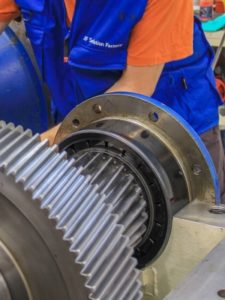
SKF Remanufacturing Services Provide Timely and Cost-Effective Solutions
SKF remanufacturing services for industrial gearboxes provide cost-effective solutions to refurbish and/or upgrade obsolete or damaged systems and quickly return them to service. A systems approach is applied to diagnose root causes of gearbox failure and prescribe technical remedies to implement proper fixes. This process further engages proprietary modeling and simulation software combined with engineering expertise to enable performance upgrades. All types and brands of gearboxes represent candidates for SKF remanufacturing services implemented at dedicated SKF gearbox repair centers.
The process begins with on-site inspection and initial diagnosis before a gearbox is sent to one of SKF’s repair centers. SKF service engineers at the repair center then disassemble, clean, inspect, and analyze critical components such as gears, bearings, shafts, and seals. Root cause analysis pinpoints why a gearbox has failed or experienced unplanned stops. Refurbishment is carried out as a complete machine renovation involving the replacement and/or reworking of parts and housings.
Refurbishment presents an opportune time to upgrade with value-added design, engineering, components, and/or precision machining for enhanced gearbox system operation. Upgrades can focus on increased power and output torque, higher service factors, and extended MTBF (Mean Time Between Failures), among other parameters.
After all work is completed, SKF performs final testing and installs the gearbox for a return to full productivity and efficiency.
Cost-benefit analysis has shown that significant cost savings may be achieved by remanufacturing a gearbox, which is typically 40% less expensive than a new unit and can be delivered much more quickly – especially important for large, purpose-built industrial gearboxes.
Gearbox remanufacturing conducted by skilled specialists employing advanced engineering and world-class components ultimately can contribute to reduced total life cycle costs, fully exploited service life, cost savings, improved uptime from increased machine availability, reduced environmental impact in terms of less energy and less scrap, and enhanced asset reliability.
